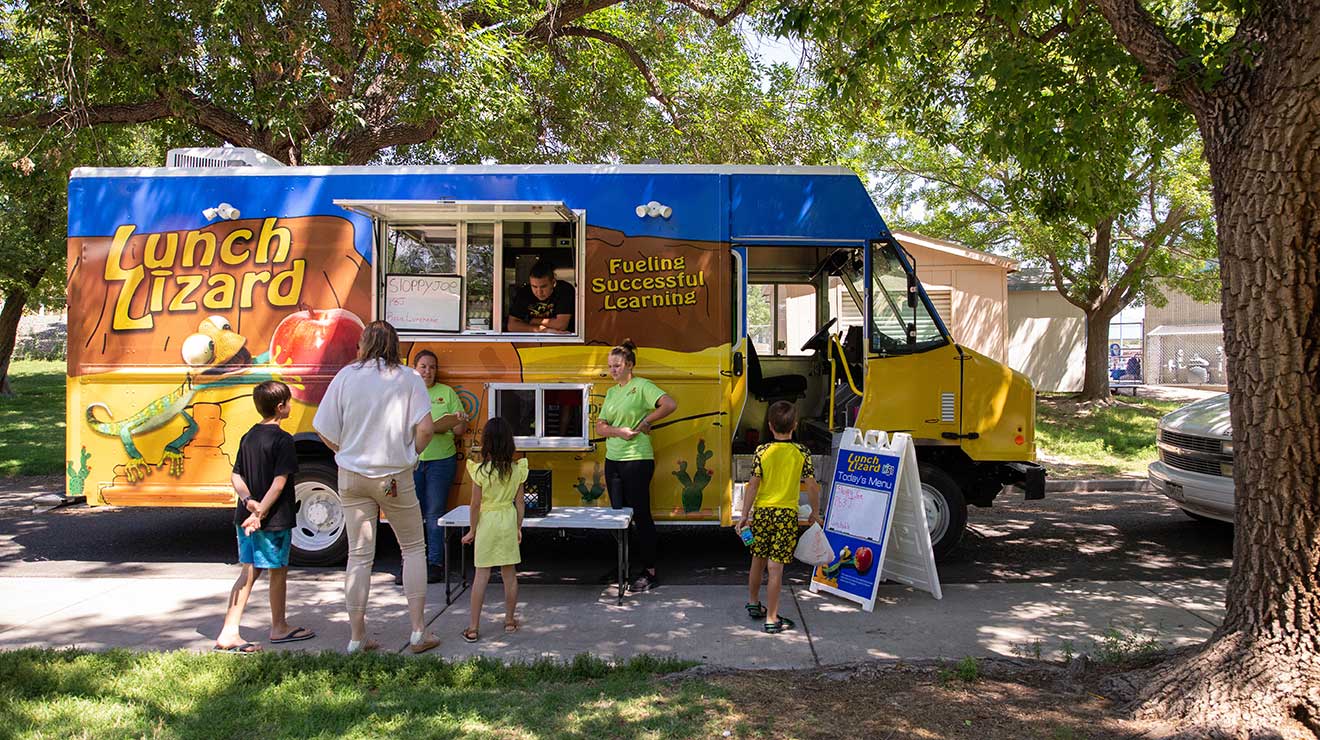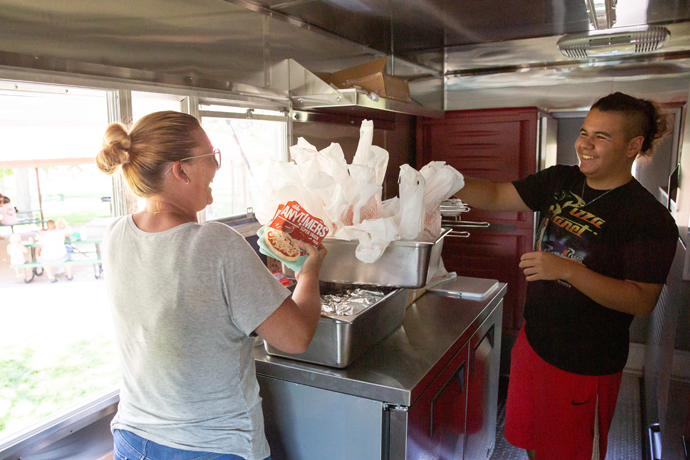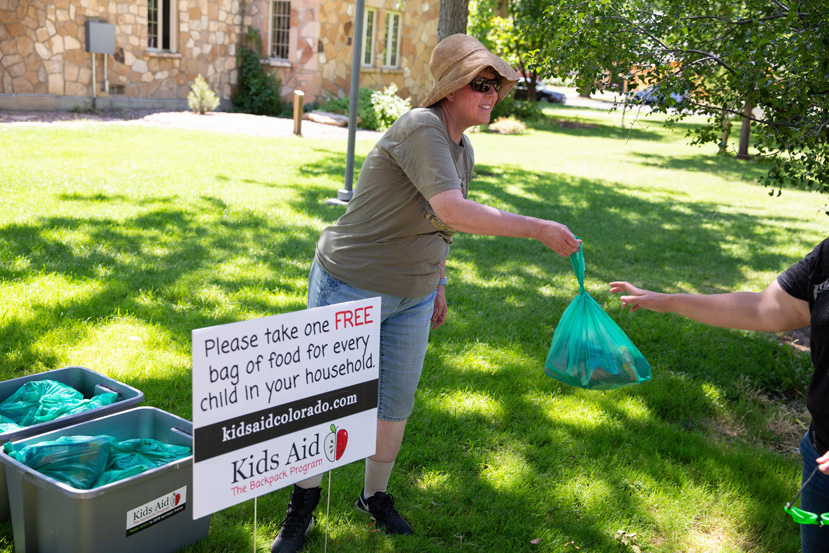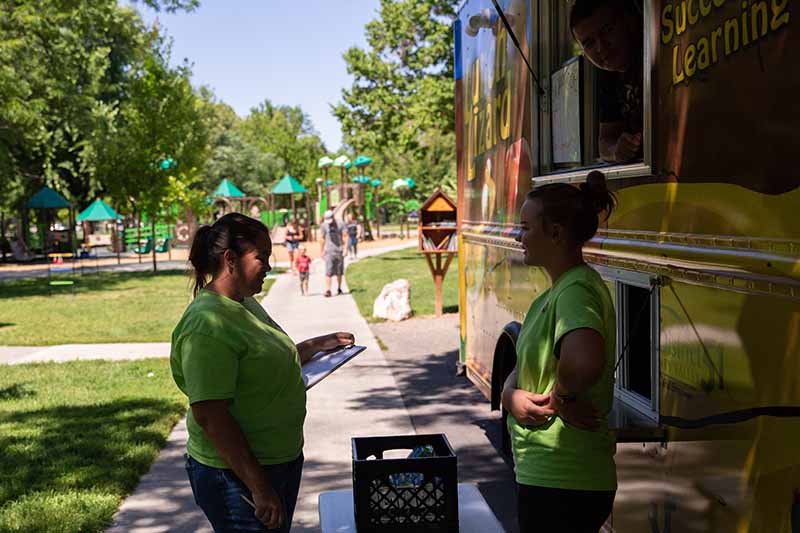
Kelly Printz, Rylee Shelton and Logan Torvic serve meals from a Lunch Lizard food truck at Lincoln Park in Grand Junction, Colo. on July 21, 2022. Photos by Luna Anna Archey /
Special to The Colorado Trust
Kelly Printz, Rylee Shelton and Logan Torvic serve meals from a Lunch Lizard food truck at Lincoln Park in Grand Junction, Colo. on July 21, 2022. Photos by Luna Anna Archey /
Special to The Colorado Trust
At the age of 4, Jade Peak has no doubt about her favorite food: grilled cheese sandwiches.
She was in luck on a recent summer day when a Lunch Lizard food truck nosed into a parking lot under a sprawling shade tree in Grand Junction’s Lincoln Park. A squad of “lunch ladies” hopped out and flipped open a large window. One worker snapped a sandwich board menu into place in front of the truck. The top offering for the day was grilled cheese.
A gaggle of kids converged on the truck from the direction of the jungle gym and the swimming pool. They quickly fell into ragtag lines, and the lunch ladies wasted no time handing out bags of food they had prepared early that morning in the kitchens at two local schools. The lunches included grilled cheese kept warm in an oven in the food truck—the “hot lunch” item of the day—or PB+J sandwiches and Lunchables cheese and meat trays for those not as enthusiastic about grilled cheese as Jade.
Each lunch came with carrot sticks, frozen strawberries, and milk—edible elements that meet federal nutrition guidelines. Many kids also requested an apparently popular item: a small cup of homemade ranch dressing for carrot dipping.
By midday, this Lunch Lizard truck and a second truck will have made the rounds at seven parks, schools and neighborhood centers and handed out about 800 lunches. That meant that 800 mostly lower-income kids did not have to go hungry on a long summer day.
Except for queries about their menu preferences, this is a no-questions-asked summer food service for kids and youth ages 18 and under in a county where the need is high. More than half of the 21,000 students in Mesa County Valley School District 51 qualify for free lunches under the USDA financial guidelines.
During the school year, their needs can be met by free school-cafeteria lunches. That will be complicated in the coming year because Congress recently discontinued funding for the “universal free school lunches” that had been allowed during the height of the COVID-19 pandemic. The universal availability during the pandemic had meant that families no longer had to submit eligibility applications to receive free lunches. Any child who wanted a lunch could get one.
That free-to-all method is how the Lunch Lizard program has operated for eight years, and how it will continue, said Dan Sharp, the nutrition services director for the school district.
Distributing lunches from trucks that mimic commercial food trucks is about removing the stigma of getting a free meal as much as it is about satisfying hunger, Sharp said. The kids coming to the trucks are not disparaged as “free kids” because children of any socioeconomic class can grab a Lunch Lizard lunch. The colorful trucks are designed to be familiar, approachable and fun, with their cartoon depictions of local landmarks and a well-known local reptile, the collared lizard. “Lonnie” the Lunch Lizard grins and proffers a shiny red apple from the side of each truck.
Judging by the jostling lines of children outside the truck, that appears to be working.
“We absolutely love to bring the grandkids to the Lunch Lizard. The kids love it,” said Jade’s grandmother, Phyllis Taylor, who cares for four grandkids during the summer and counts on the lunches to stretch a tight budget.

Inside a Lunch Lizard truck, Ashley Lenhardt and Logan Torvic prep meals to hand out to children.
The first Lunch Lizard truck hit Grand Junction streets in 2015 after a hunger gap was recognized by school officials and community organizers. In Mesa County, the median household income is just over $57,000, lagging far behind Colorado’s median income of more than $82,000. At some schools in Mesa County, around 90% of the students qualify for free lunches.
“In some difficult circumstances, this might be the only meal they get in a day,” said Anne Wenzel, president and CEO of the Western Colorado Community Foundation and a founder of the Lunch Lizard food distribution program.
The program began after Wenzel and Sharp were chatting about the summer need for nutrition. Wenzel thought it would be good to take food, via a mobile unit, to places where kids might congregate on summer days. Sharp, who has a background in hotel management, had been mulling over a similar idea. Funding for a truck was quickly patched together with local donor help from the Grand Junction Lions Club, Alpine Bank and Rocky Mountain Health Plans.
Sharp found an old commercial food truck in Denver that could be redesigned for lunch deliveries. That first truck promptly blew its generator and had to be repaired, but eight weeks later, the Lunch Lizard was painted, packed with food and ready to roll.
Sharp said he was so eager to get going on this program because he knows how important food is to school success, as well as to lifelong health.
“Studies have shown that school nutrition is one of the highest determinants to students’ well-being. It directs their ability to learn and to their overall health as adults,” Sharp said. “Providing proper nutrition also helps lower the rates of obesity.”
Eventually, the inaugural Lunch Lizard truck was replaced with a second retrofitted bread truck from Chicago. A brand-new custom-built truck was added this summer, funded by a private donor. With more than $100,000 in other donations, Wenzel said the program is going to be able to add yet another custom-built truck. The community foundation has pitched in more than $250,000 to keep the overall Lunch Lizard program rolling.
“I just think it’s a terrific program,” Wenzel said. “People here are just appalled and upset to learn that kids go hungry.”
The success of the program is borne out in numbers. In the Lunch Lizard’s first year, 4,185 lunches were handed out; in 2021, the lunch count was 29,225. Besides handing out individual sack lunches to youngsters, the trucks have also provided lunches for day care centers, camps and summer school sessions. But with the new federal cutback in the universal free school lunches, those distributions will no longer be possible next summer, Sharp said.
Neither will the option to take lunches home. The federal rollback to pre-pandemic rules means that kids will have to stick around and eat their lunches near the trucks. That will necessitate a return to having volunteers at each stop again. Prior to the pandemic, volunteers would meet at the trucks and read, do puzzles or play with hula hoops with the kids until the lunches were finished.
The Lunch Lizard program covers summer meals. Other Mesa County organizations are working to fill other gaps in food accessibility. The Mesa County Hunger Alliance, a coalition of 21 churches, social service agencies and health care providers, carries out the mission of the Mesa County Blueprint to End Hunger program, a local spinoff of a statewide initiative.
Other program partners provide meals for migrant workers, food banks, senior food deliveries, church food giveaways and a fledgling in-school effort called Snack Stations. Unopened but discarded snack foods—components of an estimated 37% of school meals, according to Sharp—are stocked in coolers and cabinets that are available to any students to grab during the day when hunger strikes.
The Kids Aid backpack program fills a weekend need when the Lunch Lizard is not on the road. Kids Aid gives out bags of shelf-stable foods that kids can easily prepare themselves. The groceries are placed in backpacks, when possible, in another attempt to remove the stigma of receiving free food.
“We kind of tag-team with the Lunch Lizard to provide these bags of groceries on weekends,” said Kids Aid Executive Director Tessa Kaiser.

Kids Aid Volunteer JoEllen Foutz hands out bags of nonperishable groceries to families in Lincoln Park.
The local program also leans on the national No Kid Hungry Center for Best Practices for mobile food-distribution tips.
Sharp said he has received so many questions from other entities about how the Lunch Lizard program works that he created a video to explain the ins and outs. At least one other Colorado county has been using the same idea: neighboring Garfield County has painted its food trucks with cartoon characters and calls its program Monkey Meal mobile delivery.
* * *
There is an added benefit that goes with Lunch Lizard program in Mesa County: Beyond the pounds of food distributed and the number of kids served, the food comes with extra helpings of affection.
“Hi, sweetie pie. I like your sea horse,” lunch lady Kim Torbic tells a shy young girl clutching a stuffed animal outside the window.
“Here’s a milk for you, darling,” she tells another child.
“Oh, you are so adorable,” fellow lunch lady Ashley Lenhardt says to a group of kids that have come red-eyed and trailing the scent of chlorine from the swimming pool.
The kids scamper away clutching their lunches. Some peer into their bags like they might be looking into a Christmas stocking. Soon, the nearby picnic tables and grassy spots in the shade are filled with lunch eaters.
The lunch ladies secure everything inside, and the Lunch Lizard is off to the next site. Some of the kids pause in their eating and wave. They know the Lunch Lizard will be back tomorrow. They know where their next lunch is coming from.
